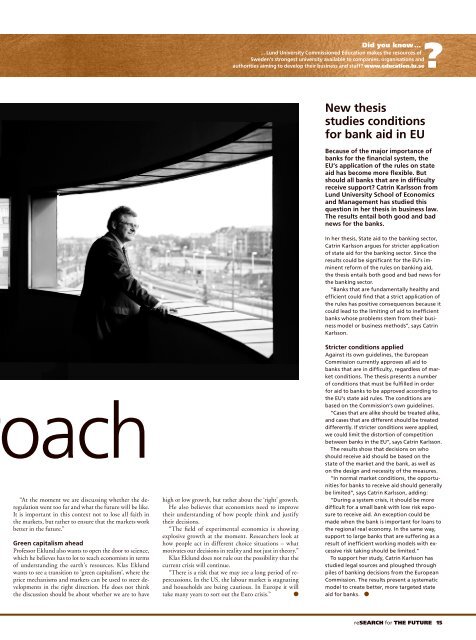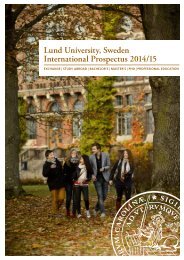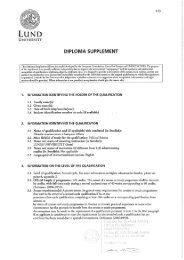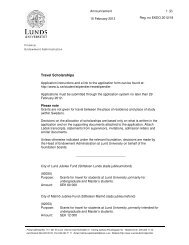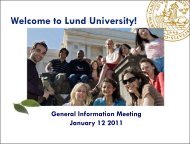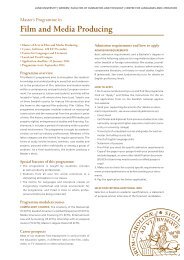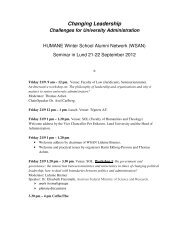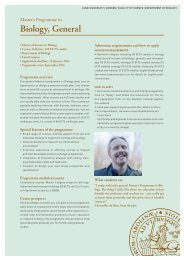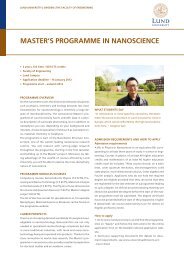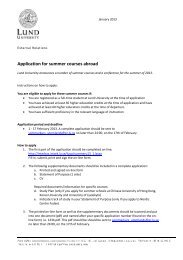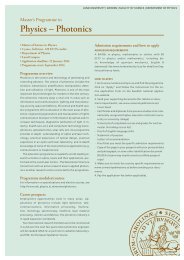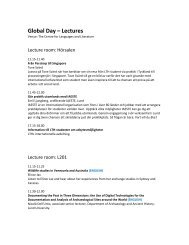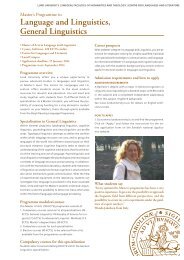"ReSearch for the Future" magazine (Pdf, 10 Mb) - Lund University
"ReSearch for the Future" magazine (Pdf, 10 Mb) - Lund University
"ReSearch for the Future" magazine (Pdf, 10 Mb) - Lund University
- No tags were found...
Create successful ePaper yourself
Turn your PDF publications into a flip-book with our unique Google optimized e-Paper software.
Did you know ...?... <strong>Lund</strong> <strong>University</strong> Commissioned Education makes <strong>the</strong> resources ofSweden’s strongest university available to companies, organisations andauthorities aiming to develop <strong>the</strong>ir business and staff? www.education.lu.seNew <strong>the</strong>sisstudies conditions<strong>for</strong> bank aid in EUBecause of <strong>the</strong> major importance ofbanks <strong>for</strong> <strong>the</strong> financial system, <strong>the</strong>EU’s application of <strong>the</strong> rules on stateaid has become more flexible. Butshould all banks that are in difficultyreceive support? Catrin Karlsson from<strong>Lund</strong> <strong>University</strong> School of Economicsand Management has studied thisquestion in her <strong>the</strong>sis in business law.The results entail both good and badnews <strong>for</strong> <strong>the</strong> banks.In her <strong>the</strong>sis, State aid to <strong>the</strong> banking sector,Catrin Karlsson argues <strong>for</strong> stricter applicationof state aid <strong>for</strong> <strong>the</strong> banking sector. Since <strong>the</strong>results could be significant <strong>for</strong> <strong>the</strong> EU’s imminentre<strong>for</strong>m of <strong>the</strong> rules on banking aid,<strong>the</strong> <strong>the</strong>sis entails both good and bad news <strong>for</strong><strong>the</strong> banking sector.“Banks that are fundamentally healthy andefficient could find that a strict application of<strong>the</strong> rules has positive consequences because itcould lead to <strong>the</strong> limiting of aid to inefficientbanks whose problems stem from <strong>the</strong>ir businessmodel or business methods”, says CatrinKarlsson.ach“At <strong>the</strong> moment we are discussing whe<strong>the</strong>r <strong>the</strong> deregulationwent too far and what <strong>the</strong> future will be like.It is important in this context not to lose all faith in<strong>the</strong> markets, but ra<strong>the</strong>r to ensure that <strong>the</strong> markets workbetter in <strong>the</strong> future.”Green capitalism aheadProfessor Eklund also wants to open <strong>the</strong> door to science,which he believes has to lot to teach economists in termsof understanding <strong>the</strong> earth’s resources. Klas Eklundwants to see a transition to ‘green capitalism’, where <strong>the</strong>price mechanisms and markets can be used to steer developmentsin <strong>the</strong> right direction. He does not think<strong>the</strong> discussion should be about whe<strong>the</strong>r we are to havehigh or low growth, but ra<strong>the</strong>r about <strong>the</strong> ‘right’ growth.He also believes that economists need to improve<strong>the</strong>ir understanding of how people think and justify<strong>the</strong>ir decisions.“The field of experimental economics is showingexplosive growth at <strong>the</strong> moment. Researchers look athow people act in different choice situations – whatmotivates our decisions in reality and not just in <strong>the</strong>ory.”Klas Eklund does not rule out <strong>the</strong> possibility that <strong>the</strong>current crisis will continue.“There is a risk that we may see a long period of repercussions.In <strong>the</strong> US, <strong>the</strong> labour market is stagnatingand households are being cautious. In Europe it willtake many years to sort out <strong>the</strong> Euro crisis.” ●Stricter conditions appliedAgainst its own guidelines, <strong>the</strong> EuropeanCommission currently approves all aid tobanks that are in difficulty, regardless of marketconditions. The <strong>the</strong>sis presents a numberof conditions that must be fulfilled in order<strong>for</strong> aid to banks to be approved according to<strong>the</strong> EU’s state aid rules. The conditions arebased on <strong>the</strong> Commission’s own guidelines.“Cases that are alike should be treated alike,and cases that are different should be treateddifferently. If stricter conditions were applied,we could limit <strong>the</strong> distortion of competitionbetween banks in <strong>the</strong> EU”, says Catrin Karlsson.The results show that decisions on whoshould receive aid should be based on <strong>the</strong>state of <strong>the</strong> market and <strong>the</strong> bank, as well ason <strong>the</strong> design and necessity of <strong>the</strong> measures.“In normal market conditions, <strong>the</strong> opportunities<strong>for</strong> banks to receive aid should generallybe limited”, says Catrin Karlsson, adding:“During a system crisis, it should be moredifficult <strong>for</strong> a small bank with low risk exposureto receive aid. An exception could bemade when <strong>the</strong> bank is important <strong>for</strong> loans to<strong>the</strong> regional real economy. In <strong>the</strong> same way,support to large banks that are suffering as aresult of inefficient working models with excessiverisk taking should be limited.”To support her study, Catrin Karlsson hasstudied legal sources and ploughed throughpiles of banking decisions from <strong>the</strong> EuropeanCommission. The results present a systematicmodel to create better, more targeted stateaid <strong>for</strong> banks. ●reSEARCH <strong>for</strong> THE FUTURE 15


